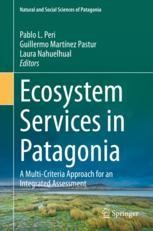Ver ítem
- xmlui.general.dspace_homeCentros Regionales y EEAsCentro Regional Patagonia SurEEA Santa CruzPartes de librosxmlui.ArtifactBrowser.ItemViewer.trail
- Inicio
- Centros Regionales y EEAs
- Centro Regional Patagonia Sur
- EEA Santa Cruz
- Partes de libros
- Ver ítem
Imaginaries, transformations, and resistances in Patagonian territories from a socio-ecological perspective.
Resumen
Socially shared expectations about people’s behavior and worldviews, both in terms of how they work and how they should work, are part of the concept of social imaginaries. Beyond representing the idiosyncrasy of a society, imaginaries can play cohesive, critical, or transformative roles over societies and their supporting systems. Therefore, we postulate that by modulating nature-society
relationships, social imaginaries can represent transformative or
[ver mas...]
Socially shared expectations about people’s behavior and worldviews, both in terms of how they work and how they should work, are part of the concept of social imaginaries. Beyond representing the idiosyncrasy of a society, imaginaries can play cohesive, critical, or transformative roles over societies and their supporting systems. Therefore, we postulate that by modulating nature-society
relationships, social imaginaries can represent transformative or resistance forces affecting the provision, capture, and distribution of ecosystem services (ES). We analyze nature-society social imaginaries (NSI) based on previously published information, with particular attention to their influences on the provision, capture, and social distribution of ES in Patagonian landscapes of Argentina and Chile. Firstly, we built and used a conceptual NSI framework that integrates the concepts of ES, social imaginaries, and the governance of natural capital. Secondly, we applied the NSI framework to selected case studies addressing four main drivers of
change in Patagonian socio-ecological systems (SES): (i) land dispossession, (ii) industrial forestry expansion, (iii) touristification, and (iv) damming of rivers for hydroelectric uses. According to our analyses, Patagonian SES are being affected by typical transforming forces of the modern imaginary (e.g., short term, productivity, reductionist-mechanistic vision, individualism) as well as forces of resistance that characterize postmodern (e.g., intergenerational concern, ecocentrism, holism) and indigenous (e.g., territorial ancestral rights, living well in harmony with nature) imaginaries. These three main NSI underlie controversies around public policies and governance of ES, by influencing the shared perception of nature contributions to well-being, the shared expectations about human behaviors (governance institutions), and/or the final decisions affecting natural capital. We discuss the variation of the relative importance of these three mechanisms across NSI types.
[Cerrar]

Autor
Laterra, Pedro;
Nahuelhual, Laura;
Gluch, Mariana;
Peri, Pablo Luis;
Martinez Pastur, Guillermo José;
Editor - Compilador
Peri, Pablo Luis;
Martinez Pastur, Guillermo José;
Nahuelhual, Laura;
Fuente
Ecosystem Services in Patagonia: A Multi-Criteria Approach for an Integrated Assessment (Eds. Peri P.L.; Martínez Pastur G.; Nahuelhual L.). Switzerland : Springer. Chapter 19, p. 397-427
Fecha
2021-04-27
Editorial
Springer
ISSN
2662-3463
2662-3471
2662-3471
ISBN
978-3-030-69165-3 (hardcover)
978-3-030-69168-4 (Softcover)
978-3-030-69166-0 (eBook)
978-3-030-69168-4 (Softcover)
978-3-030-69166-0 (eBook)
Formato
pdf
Tipo de documento
parte de libro
Palabras Claves
Derechos de acceso
Restringido
 Excepto donde se diga explicitamente, este item se publica bajo la siguiente descripción: Creative Commons Attribution-NonCommercial-ShareAlike 2.5 Unported (CC BY-NC-SA 2.5)
Excepto donde se diga explicitamente, este item se publica bajo la siguiente descripción: Creative Commons Attribution-NonCommercial-ShareAlike 2.5 Unported (CC BY-NC-SA 2.5)

